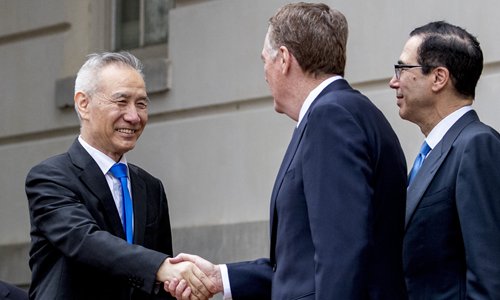HOME >> SOURCE
Phase one trade deal a step forward, a new beginning
Source:Global Times Published: 2019/12/14 1:06:15

Chinese Vice Premier Liu He (left) shakes hands with US Trade Representative Robert Lighthizer (center) alongside US Treasury Secretary Steven Mnuchin as Liu arrives at the Office of the US Trade Representative for trade negotiations in Washington DC, Friday. Photo: AP
This marks the first time in about 20 months that the two sides have agreed on the text of a trade agreement. It could be said that China-US trade talks have achieved periodic achievements and indicates both sides have moved a step forward. The international community has been waiting for the two sides to take this step.
The optimistic uptick in global stock markets from Thursday and Friday shows that the China-US deal is set to boost global market confidence and push all sides to settle trade disputes in a win-win manner.
Rome was not built in a day. Trade protectionism has expanded in some places of the world, affecting some people's thinking. It is not easy for China and the US to agree on the text of the deal. But how to define this deal and whether it can keep its positive effects on the global market and even accumulate more positive energy will depend on further efforts from China and the US, as the global market has been disturbed by the trade war.
We must see that the first phase of the trade agreement is a win-win outcome which will deliver tangible benefits to the world. The response from investors around the world is most real because they would not use their own money just to make a grand gesture. However, some people in both China and the US may hype that their own country suffers loss from this deal. This is a natural counter-stream of public opinion, but does not represent the mainstream attitude on either side.
China and the US have been locked in a trade war for about 20 months and neither side could overwhelm the other to recklessly impose its own will on the other. Such a fact has been realistically understood by the mainstream society of both countries. Both China and the US are capable of prolonging the trade war. If they want to prevent the trade war from expanding further and want to back off, both sides must make compromises and accept a condition where the interests of both sides are maximized.
The US-China trade war happens at a time when the US' strategic thinking on China has changed. This requires Washington to find a strategic impetus to end the trade war. So what would be such a strategic impetus?
We believe as long as the US side is realistic, it is possible that such a strategic impetus can be formed and gradually expanded. The trade war is not an effective way to resolve the strategic competition between China and the US. It can neither scare China nor effectively weaken China, but will cause a gradual rise in the cost of the US economy.
It is hoped that both China and the US can derive positive things from the phase one trade deal, and take it as an opportunity to build a solid foundation for the two sides to eliminate and reduce differences and build more confidence through patient negotiations.
The Chinese people should also take note that the trade war was initiated by the US, and China was forced to respond. Under the staunch leadership of the Party and the government, the Chinese side has always insisted on the principle of "We don't want a trade war, but we are not afraid of it, and when necessary we will fight back." While we resolutely fight back, we also open the door to negotiations. Our front has never drifted into chaos. China is a great nation with strength, willpower and wisdom. All these have been proved over the past months.
China loves peace and is committed to continuous progress. We do not complain for suffering the trade war. As every coin has two sides, we are willing to look at the possible positive relationship between this trade war and China's further reform and opening-up from a historical perspective. The consumption upgrade for Chinese people needs US imports such as good-quality agricultural products. And strengthening intellectual property protection and expanding market access are the directions of China's reform and opening-up. The greater China's vision is, the further the country can go.
RELATED ARTICLES:
Posted in: GT VOICE